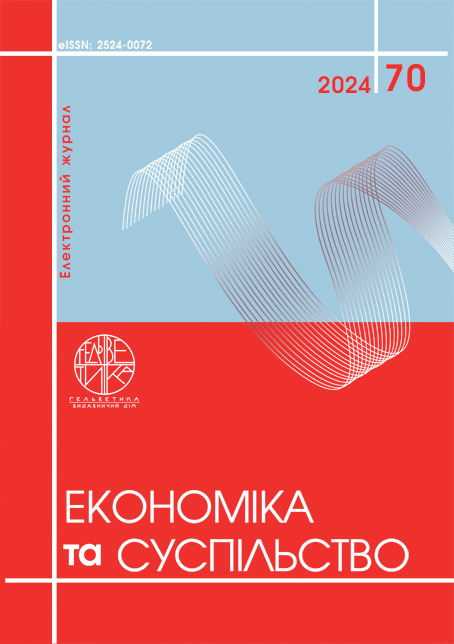CULINARY ETHNOLOGY IN THE CONTEXT OF SUSTAINABLE DEVELOPMENT OF THE HOSPITALITY INDUSTRY
Abstract
This study examines the role of culinary ethnology in fostering sustainable development within the hospitality industry, with a particular emphasis on integrating local ingredients and ethnic cuisine into hotel and restaurant business models. The research highlights how locally sourced food products contribute to economic growth, social stability, and environmental sustainability by reducing transportation costs, supporting local farmers, and preserving cultural heritage. Findings indicate that the adoption of local ingredients in restaurants and hospitality establishments not only promotes ecological responsibility but also enhances consumer engagement through unique gastronomic experiences. The study further explores how ethnic cuisine functions as a cultural identity marker, attracting both domestic and international tourists. By examining real-world examples, including restaurants, gastronomic festivals, and collaborations between local farms and hospitality venues, the research identifies best practices for incorporating sustainable food sourcing strategies into the industry. The analysis reveals that locally sourced ingredients can reduce logistical expenses by up to 20%, lower CO₂ emissions by 25%, and decrease food waste by 15%. Additionally, 80% of surveyed tourists expressed a strong preference for restaurants that prioritize local and seasonal products, reinforcing the economic and branding advantages of this approach. Restaurants that integrate geographical indications (GIs) and protected designation of origin (PDO) certifications for their products can further elevate their market competitiveness while promoting regional culinary heritage. The study presents actionable recommendations for both hospitality businesses and agricultural producers to optimize their collaboration. These include: developing direct partnerships between restaurants and farmers, ensuring a stable supply chain for high-quality ingredients; implementing marketing strategies that highlight the cultural and environmental benefits of local food; encouraging government support and policy incentives to strengthen sustainable gastronomic tourism; introducing educational programs for farmers and hospitality professionals to enhance their understanding of eco-friendly food production. By synthesizing insights from field research, stakeholder interviews, and economic impact assessments, this paper underlines the transformative potential of culinary ethnology as a sustainability driver in the modern hospitality industry. The conclusions emphasize that embracing local culinary traditions not only enhances business performance but also fosters regional identity, improves food security, and aligns with global sustainability initiatives.
References
Дишкантюк О., Власюк К. Гастрономічний туризм: підручник. Одеса, 2021. 136 с.
Лепкий М., Левчук О. Гастрономічний туризм як інструмент брендингу регіонів України. Інновації та технології в сфері послуг і харчування. 2024. № 3 (13). С. 62–68. DOI: https://doi.org/10.32782/2708-4949.3(13).2024.10
Костиря І.О., Білецька О.О. Гастрономічний туризм як інструмент культурного брендингу України. Питання культурології. 2021. № (38). С. 301–313. DOI: https://doi.org/10.31866/2410-1311.38.2021.247174
Церклевич В., Онищук М., Шпаковський С. Культурні детермінанти еволюції гастрономічних спеціалітетів: до питання формування гастрономічного бренду Поділля. Трансформаційна економіка. 2023. № 1 (01). С. 67–75. DOI: https://doi.org/10.32782/2786-8141/2023-1-12
Френкель І. Гастроспадщина – ресурс розвитку економіки регіонів. URL: https://uccs.org.ua/novyny/hastrospadshchyna-resurs-rozvytkuekonomiky-rehioniv/
Душар М. Гастрономічна спадщина та національна ідентичність. URL: https://www.istpravda.com.ua/columns/2021/08/11/159985
Dunnea J. B. What does ‘local’ mean in the grocery store? Multiplicity in food retailers’ perspectives on sourcing and marketing local foods / J. B. Dunnea, K. J. Chambers, K. J. Giombolinia and others // Renewable Agriculture and Food Systems. 2011. Vol. 26. Iss. 01. Pp. 46–59.
Global Report on Food Tourism. – World Tourism Organization (UNWTO), Madrid, Spain. 2012. P. 63.
Крисанов Д. Географічні зазначення походження агропродовольчої продукції: європейський досвід і вітчизняні перспективи. Економіст. 2014. № 10. С. 18–24.
Dyshkantiuk, O., & Vlasiuk, K. (2021). Gastronomic Tourism: Textbook. Odesa, 136 p.
Lepkyi, M., & Levchuk, O. (2024). Gastronomic tourism as a tool for regional branding in Ukraine. Innovations and Technologies in the Field of Services and Catering, 3(13), 62–68. DOI: https://doi.org/10.32782/2708-4949.3(13).2024.10
Kostyria, I. O., & Biletska, O. O. (2021). Gastronomic tourism as a tool for cultural branding of Ukraine. Cultural Studies Issues, (38), 301–313. DOI: https://doi.org/10.31866/2410-1311.38.2021.247174
Tserklevych, V., Onyshchuk, M., & Shpakovskyi, S. (2023). Cultural determinants of the evolution of gastronomic specialties: Towards the formation of the gastronomic brand of Podillia. Transformational Economics, 1(01), 67–75. DOI: https://doi.org/10.32782/2786-8141/2023-1-12
Frenkel, I. (2024). Gastro-heritage as a resource for regional economic development. Available at: https://uccs.org.ua/novyny/hastrospadshchyna-resurs-rozvytkuekonomiky-rehioniv/ (accessed 15.10.2024).
Dushar, M. (2021). Gastronomic heritage and national identity. Available at: https://www.istpravda.com.ua/columns/2021/08/11/159985 (accessed 15.10.2024).
Dunnea, J. B., Chambers, K. J., Giombolini, K. J., et al. (2011). What does ‘local’ mean in the grocery store? Multiplicity in food retailers’ perspectives on sourcing and marketing local foods. Renewable Agriculture and Food Systems, 26(1), 46–59.
World Tourism Organization (UNWTO). (2012). Global Report on Food Tourism. Madrid: UNWTO. 63 p.
Krysanov, D. (2014). Geographical indications of the origin of agri-food products: European experience and domestic perspectives. Economist, (10), 18–24.

This work is licensed under a Creative Commons Attribution 4.0 International License.


